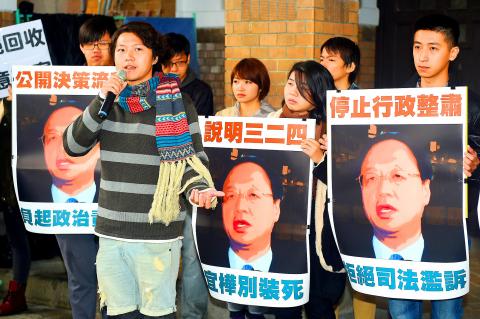|
Students blast Jiang over protest violence
TAKING RESPONSIBILITY: Participants in the Occupy Executive Yuan urged all schools not to hire the outgoing premier, saying he is a poor model for students
By Alison Hsiao / Staff reporter

Students hold up pictures of outgoing Premier Jiang Yi-huah at a protest at National Taiwan University yesterday, demanding that Jiang not be allowed to return to teach at the school.
Photo: Liao Chen-huei, Taipei Times
A group of students and citizens who participated in the occupation of the plaza of the Executive Yuan and were forcibly ejected by police on March 24 during the Sunflower movement yesterday called on outgoing Premier Jiang Yi-huah (江宜樺) to take responsibility for his part in the violence inflicted upon the protesters before attempting to return to academia.
Jiang, a former political science professor at National Taiwan University, resigned as premier to assume “political responsibility” for the Chinese Nationalist Party’s (KMT) drubbing in Saturday’s nine-in-one elections, but various controversies that occurred during his term have not been straightened out, especially the police’s violent action on March 24, the group said.
They asked that Jiang make public the decisionmaking process that led to the order demanding the forced eviction of protesters.
One of the protesters, surnamed Chiu (邱), told a press conference that he was a witness to and victim of police violence that night.
He said that while the attack might be partly attributed to tensions that had built up between the police and protesters since the Sunflower movement started on March 18, he found it “hard to believe that the commander on the scene would have dared to order the officers to attack the protesters [on his own accord].”
“So the crux lies in the question of which government agency — the Executive Yuan or the National Police Agency — issued the order,” Chiu said, adding that Jiang could not leave his post believing that his conscience is clear without facing the issue.
The group called on all schools in the nation to refuse Jiang any teaching posts after he leaves the Cabinet, “since he is a negative example and has no value to either students or education per se.”
The government not only used unnecessary force and accused the protesters, but it has also continued to “abuse police power and judicial resources to harass people who on March 24 stood up against the government’s black-box [opaque]” handling of agreements with China.
Many of the protesters who filed private prosecutions against the Executive Yuan and the National Police Agency have found themselves defendants after the charges were made in court.
“Even the witnesses who came forward originally to substantiate our charges have been summoned by the police [as defendants],” said Judicial Reform Foundation deputy executive director Chen Yu-fan (陳雨凡), who has been assisting people in making the claims of abuse.
“Documents about private prosecutions provided to the court should not have ended up in the hands of prosecutors,” Chen said.
“We don’t have sufficient evidence to accuse the government of abusing the system and using what we have provided to the court to against us, but what has happened has made us entertain the possibility,” she added.
The group urged incoming premier Mao Chi-kuo (毛治國) to stop employing executive power to abuse the judicial system.
source: Taipei Times
|